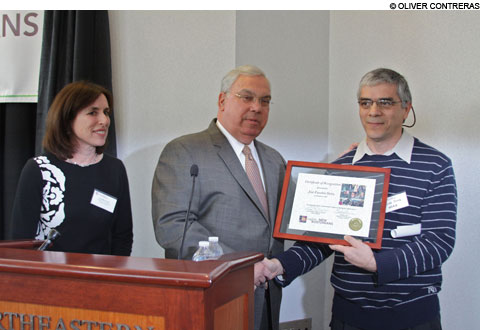
STAR PUPIL A native of Colombia, José Eusebio Ortiz (right, with Mayor Tom Menino) became fluent through the English for New Bostonians program, one of several initiaives working to provide language lessons to new immigrants. |
Lucía López did not cross the border by foot, nor did she pay a smuggler thousands of dollars to get here. She took a plane to Boston from her native Peru, and hasn't left.
López quit her job as an art teacher back home to look for better opportunities in America. She's lived in New England since 2008: first in Maine, then in Everett, and now in East Boston. Despite a university education, however, she had little knowledge of English before coming here.
"When you go to college in Latin America, they teach you English classes but, as they say, theory is very different than real life," says López. "It was such a drama to communicate. I was first working in Everett as a babysitter, taking care of kids who spoke Portuguese. At least I could attempt to guess some Portuguese, but I was lost with English."
The 2010 US Census only confirmed what we in Massachusetts knew anecdotally: that the faces and voices of the commonwealth have changed dramatically in the past 10 years. The Census figures, just released this week, show that the Hispanic and Asian populations grew by 46 percent each in the last decade. Thus, downtown Framingham has become Little Brazil, Lowell and Lynn both have thriving Cambodian communities, and East Boston is now a Colombian and Central American haven. In fact, Massachusetts's nearly one million immigrants rank it seventh in the nation in the number of foreign-born residents, according to figures from the Migration Policy Institute. And, like López, many of these new Bay Staters don't speak English when they arrive.
Earlier this month, the Boston Foundation issued a landmark report on the state of English language services in the Greater Boston area. Of the approximately 240,000 adult immigrants identified as having limited English proficiency (or LEPs, as they are known in the system), the report says only five percent are being served by programs supported by the state's Department of Elementary and Secondary Education and other funders.
The reasons why there is such a huge disconnect between the supply and demand sides of English for Speakers of Other Languages (ESOL) classes are not as clear-cut as people would like to believe. Adult immigrants like López are often hard to reach, as they almost certainly feel more protected and happier in the company of their fellow native-speaking neighbors in areas like Little Brazil.
You can try making the case by establishing the economic incentive of learning the language: according to the Boston Foundation report, the average immigrant in Massachusetts who does not speak English well makes about $14,000 annually, whereas an immigrant who is fluent in English earns approximately $38,000. Furthermore, among college-educated immigrants, speaking English fluently could mean making $20,000 more per year.